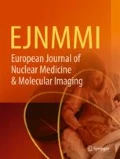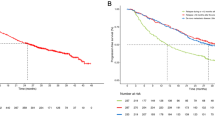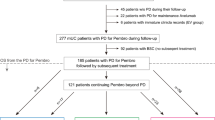Abstract
Background
Data are sparse regarding the feasibility of radioligand therapy (RLT) with [177Lu]Lu-PSMA-617 as a retreatment. We aimed to assess the outcome and safety of rechallenge PSMA-RLT in patients with progressive prostatic cancer who previously benefited from this therapy.
Materials and methods
Patients who received rechallenge therapy at our department from January 2015 to March 2018 were assessed. Non-haematological and haematological adverse events were evaluated from laboratory data and clinical reports and were graded according to the Common Terminology Criteria for Adverse Events (CTCAE v. 5.0). Time to prostate-specific-antigen (PSA) progression and the overall survival (OS) rate of the study patients were calculated from the date of the first rechallenge cycle. Furthermore, the OS calculated from the first cycle baseline PSMA-RLT was compared with the survival of patients who received only baseline PSMA-RLT. The response data were determined using [68Ga]Ga-PSMA-PET/CT and measurements of the tumour marker PSA.
Results
Included in this retrospective study were 30 patients who were initially treated with a median of 3 cycles (range 1–5) of PSMA-RLT and were eventually retreated after a median of 6 months (range 2–26). Each patient received a median of 3 (range 1–6) rechallenge cycles. None of the patients experienced a disabling or life-threatening grade 4 adverse event according to the Common Toxicity Criteria (CTC). Grade 3 toxicity occurred in 8 patients (27%). Serious adverse events included leucopoenia (n = 2), neutropoenia (n = 1), anaemia (n = 4), thrombopenia (n = 4) and elevated renal parameters (n = 1). Irreversible adverse events occurred in 21 patients (70%). The permanent adverse events were mild/moderate (CTC grade 1/2) in 19 patients and serious (CTC grade 3) in two patients, respectively. According to PSA measurements, 75–90% of patients showed a benefit (response/stable) from the first 4 rechallenge cycles. The median OS was 12 months calculated from the first rechallenge cycle and 25 months calculated from the first cycle baseline PSMA-RLT. For comparison, the median OS in patients who received only baseline PSMA-RLT was 9 months. The difference according to the logrank test was significant: p value <0.001. Patients with a PSA decrease after the first cycle of rechallenge PSMA-RLT survived a median of 19 months, while patients with a PSA increase survived only 6 months.
Conclusion
Rechallenge prostate-specific membrane antigen (PSMA) therapy has an acceptable safety profile. The majority of the retreated patients benefited from the rechallenge therapy. Patients who showed a biochemical response achieved a longer OS compared to patients who did not respond. The median OS was significantly longer in patients after rechallenge PSMA-RLT than in patients who received only baseline PSMA-RLT.


Similar content being viewed by others
References
Silver DA, Pellicer I, Fair WR, Heston WD, Cordon-Cardo C. Prostate-specific membrane antigen expression in normal and malignant human tissues [eng]. Clin Cancer Res. 1997;3(1):81–5.
Santoni M, Scarpelli M, Mazzucchelli R, Lopez-Beltran A, Cheng L, Cascinu S, et al. Targeting prostate-specific membrane antigen for personalized therapies in prostate cancer: morphologic and molecular backgrounds and future promises [eng]. J Biol Regul Homeost Agents. 2014;28(4):555–63.
Mhawech-Fauceglia P, Zhang S, Terracciano L, Sauter G, Chadhuri A, Herrmann FR, et al. Prostate-specific membrane antigen (PSMA) protein expression in normal and neoplastic tissues and its sensitivity and specificity in prostate adenocarcinoma: an immunohistochemical study using mutiple tumour tissue microarray technique [eng]. Histopathology. 2007. https://doi.org/10.1111/j.1365-2559.2007.02635.x.
Ghosh A, Heston WDW. Tumor target prostate specific membrane antigen (PSMA) and its regulation in prostate cancer [eng]. J Cell Biochem. 2004. https://doi.org/10.1002/jcb.10661.
Wang X, Yin L, Rao P, Stein R, Harsch KM, Lee Z, et al. Targeted treatment of prostate cancer [ENG]. J Cell Biochem. 2007. https://doi.org/10.1002/jcb.21491.
Wright GL, Mayer Grob B, Haley C, Grossman K, Newhall K, Petrylak D, et al. Upregulation of prostate-specific membrane antigen after androgen-deprivation therapy. Urology. 1996. https://doi.org/10.1016/S0090-4295(96)00184-7.
Jamous M, Haberkorn U, Mier W. Synthesis of peptide radiopharmaceuticals for the therapy and diagnosis of tumor diseases [ENG]. Molecules. 2013. https://doi.org/10.3390/molecules18033379.
Benesova M, Schafer M, Bauder-Wust U, Afshar-Oromieh A, Kratochwil C, Mier W, et al. Preclinical evaluation of a tailor-made DOTA-conjugated PSMA inhibitor with optimized linker moiety for imaging and endoradiotherapy of prostate cancer [ENG]. J Nucl Med. 2015. https://doi.org/10.2967/jnumed.114.147413.
Afshar-Oromieh A, Hetzheim H, Kratochwil C, Benesova M, Eder M, Neels OC, et al. The theranostic PSMA ligand PSMA-617 in the diagnosis of prostate cancer by PET/CT: biodistribution in humans, radiation dosimetry, and first evaluation of tumor lesions [eng]. J Nucl Med. 2015. https://doi.org/10.2967/jnumed.115.161299.
Rajasekaran SA, Anilkumar G, Oshima E, Bowie JU, Liu H, Heston W, et al. A novel cytoplasmic tail MXXXL motif mediates the internalization of prostate-specific membrane antigen [eng]. Mol Biol Cell. 2003. https://doi.org/10.1091/mbc.E02-11-0731.
Rahbar K, Afshar-Oromieh A, Jadvar H, Ahmadzadehfar H. PSMA Theranostics: current status and future directions [eng]. Mol Imaging. 2018. https://doi.org/10.1177/1536012118776068.
Ahmadzadehfar H, Aryana K, Pirayesh E, Farzanehfar S, Assadi M, Fallahi B, et al. The Iranian Society of Nuclear Medicine practical guideline on radioligand therapy in metastatic castration-resistant prostate cancer using 177Lu-PSMA. Iranian Journal of Nuclear Medicine. 2018;26(1):2–8.
Wüstemann T, Haberkorn U, Babich J, Mier W. Targeting prostate cancer: prostate-specific membrane antigen based diagnosis and therapy [eng]. Med Res Rev. 2018. https://doi.org/10.1002/med.21508.
Ahmadzadehfar H, Albers P, Bockisch A, Boegemann M, Böhme C, Burchert W, et al. Lutetium-177-PSMA-Radioligandentherapie: Konsensus im Rahmen der GKV-finanzierten Versorgung zwischen den Hochschulkliniken in Aachen, Bonn, Düsseldorf, Essen und Köln und dem MDK Nordrhein. [Lutetium-177-PSMA radioligand therapy : consensus within the framework of GKV-funded care between the university hospitals in Aachen, Bonn, Düsseldorf, Essen, and Cologne and the MDK Nordrhein] [ger]. Urologe A. 2018. https://doi.org/10.1007/s00120-018-0642-2.
Fendler WP, Kratochwil C, Ahmadzadehfar H, Rahbar K, Baum RP, Schmidt M, et al. Therapie mit 177Lu-PSMA-617, Dosimetrie und Nachsorge beim metastasierten kastrationsresistenten Prostatakarzinom. [177Lu-PSMA-617 therapy, dosimetry and follow-up in patients with metastatic castration-resistant prostate cancer] [ger]. Nuklearmedizin. 2016;55(3):123–8.
Yadav MP, Ballal S, Tripathi M, Damle NA, Sahoo RK, Seth A, et al. 177Lu-DKFZ-PSMA-617 therapy in metastatic castration resistant prostate cancer: safety, efficacy, and quality of life assessment [eng]. Eur J Nucl Med Mol Imaging. 2017. https://doi.org/10.1007/s00259-016-3481-7.
Rahbar K, Schmidt M, Heinzel A, Eppard E, Bode A, Yordanova A, et al. Response and tolerability of a single dose of 177Lu-PSMA-617 in patients with metastatic castration-resistant prostate cancer: a multicenter retrospective analysis [eng]. J Nucl Med. 2016. https://doi.org/10.2967/jnumed.116.173757.
Rahbar K, Bögeman M, Yordanova A, Eveslage M, Schäfers M, Essler M, et al. Delayed response after repeated 177Lu-PSMA-617 radioligand therapy in patients with metastatic castration resistant prostate cancer [eng]. Eur J Nucl Med Mol Imaging. 2018. https://doi.org/10.1007/s00259-017-3877-z.
Rahbar K, Bode A, Weckesser M, Avramovic N, Claesener M, Stegger L, et al. Radioligand therapy with 177Lu-PSMA-617 as a novel therapeutic option in patients with metastatic castration resistant prostate cancer [eng]. Clin Nucl Med. 2016. https://doi.org/10.1097/RLU.0000000000001240.
Rahbar K, Ahmadzadehfar H, Kratochwil C, Haberkorn U, Schafers M, Essler M, et al. German multicenter study investigating 177Lu-PSMA-617 Radioligand therapy in advanced prostate cancer patients [eng]. J Nucl Med. 2017. https://doi.org/10.2967/jnumed.116.183194.
Kulkarni HR, Singh A, Schuchardt C, Niepsch K, Sayeg M, Leshch Y, et al. PSMA-based radioligand therapy for metastatic castration-resistant prostate cancer: the Bad Berka experience since 2013 [eng]. J Nucl Med. 2016. https://doi.org/10.2967/jnumed.115.170167.
Kratochwil C, Giesel FL, Stefanova M, Benešová M, Bronzel M, Afshar-Oromieh A, et al. PSMA-targeted radionuclide therapy of metastatic castration-resistant prostate cancer with 177Lu-labeled PSMA-617 [eng]. J Nucl Med. 2016. https://doi.org/10.2967/jnumed.115.171397.
Baum RP, Kulkarni HR, Schuchardt C, Singh A, Wirtz M, Wiessalla S, et al. 177Lu-labeled prostate-specific membrane antigen radioligand therapy of metastatic castration-resistant prostate cancer: safety and efficacy [eng]. J Nucl Med. 2016. https://doi.org/10.2967/jnumed.115.168443.
Ahmadzadehfar H, Wegen S, Yordanova A, Fimmers R, Kürpig S, Eppard E, et al. Overall survival and response pattern of castration-resistant metastatic prostate cancer to multiple cycles of radioligand therapy using 177LuLu-PSMA-617 [eng]. Eur J Nucl Med Mol Imaging. 2017. https://doi.org/10.1007/s00259-017-3716-2.
Ahmadzadehfar H, Rahbar K, Kürpig S, Bögemann M, Claesener M, Eppard E, et al. Early side effects and first results of radioligand therapy with (177)Lu-DKFZ-617 PSMA of castrate-resistant metastatic prostate cancer: a two-Centre study [eng]. EJNMMI Res. 2015. https://doi.org/10.1186/s13550-015-0114-2.
Ahmadzadehfar H, Eppard E, Kürpig S, Fimmers R, Yordanova A, Schlenkhoff CD, et al. Therapeutic response and side effects of repeated radioligand therapy with 177Lu-PSMA-DKFZ-617 of castrate-resistant metastatic prostate cancer [eng]. Oncotarget. 2016. https://doi.org/10.18632/oncotarget.7245.
Yordanova A, Becker A, Eppard E, Kürpig S, Fisang C, Feldmann G, et al. The impact of repeated cycles of radioligand therapy using 177LuLu-PSMA-617 on renal function in patients with hormone refractory metastatic prostate cancer [eng]. Eur J Nucl Med Mol Imaging. 2017. https://doi.org/10.1007/s00259-017-3681-9.
Ahmadzadehfar H, Schlolaut S, Fimmers R, Yordanova A, Hirzebruch S, Schlenkhoff C, et al. Predictors of overall survival in metastatic castration-resistant prostate cancer patients receiving 177LuLu-PSMA-617 radioligand therapy [eng]. Oncotarget. 2017. https://doi.org/10.18632/oncotarget.21600.
Bräuer A, Grubert LS, Roll W, Schrader AJ, Schäfers M, Bögemann M, et al. 177Lu-PSMA-617 radioligand therapy and outcome in patients with metastasized castration-resistant prostate cancer [eng]. Eur J Nucl Med Mol Imaging. 2017. https://doi.org/10.1007/s00259-017-3751-z.
References National Cancer Institute Guidelines For Investigators: Adverse event reporting requirements for DCTC DCTD (CTEP and CIP) and DCP INDs and IDEs. 2013. - Google-Suche. Available from: https://www.google.de/webhp?sourceid=chrome-instant&ion=1&espv=2&ie=UTF-8#q=references+National+Cancer+Institute+Guidelines+For+Investigators:+Adverse+event+reporting+requirements+for+DCTC+DCTD+(CTEP+and+CIP)+and+DCP+INDs+and+IDEs.+2013. Accessed 11 Oct 2018.
Scher HI, Morris MJ, Stadler WM, Higano C, Basch E, Fizazi K, et al. Trial design and objectives for castration-resistant prostate cancer: updated recommendations from the prostate cancer clinical trials working group 3 [eng]. J Clin Oncol. 2016. https://doi.org/10.1200/JCO.2015.64.2702.
Hofman MS, Violet J, Hicks RJ, Ferdinandus J, Thang SP, Akhurst T, et al. [ 177 Lu]-PSMA-617 radionuclide treatment in patients with metastatic castration-resistant prostate cancer (LuPSMA trial): a single-Centre, single-arm, phase 2 study. Lancet Oncol. 2018. https://doi.org/10.1016/S1470-2045(18)30198-0.
Eisenhauer EA, Therasse P, Bogaerts J, Schwartz LH, Sargent D, Ford R, et al. New response evaluation criteria in solid tumours: revised RECIST guideline (version 1.1) [English]. Eur J Cancer. 2009. https://doi.org/10.1016/j.ejca.2008.10.026.
Taeger P, Hammes J, Hohberg M, Wild M, Schomaecker K, Kobe C, et al. Discrete evaluation of multi-cycle Lu-177-PSMA-617-therapy effects on bone versus lymph node metastases in patients with metastasized castration-resistant prostate cancer (mCRPC). J Nucl Med. 2018;59(supplement 1):523.
Author information
Authors and Affiliations
Corresponding author
Ethics declarations
Conflict of interest
The authors declare that they have no financial or non-financial competing interests.
Ethical approval
All procedures performed in studies involving human participants were in accordance with the ethical standards of the institutional and/or national research committee and with the principles of the 1964 Declaration of Helsinki and its later amendments or comparable ethical standards. This article does not describe any studies with animals performed by any of the authors.
Informed consent
Informed consent was obtained from all individual participants included in the study.
Rights and permissions
About this article
Cite this article
Yordanova, A., Linden, P., Hauser, S. et al. Outcome and safety of rechallenge [177Lu]Lu-PSMA-617 in patients with metastatic prostate cancer. Eur J Nucl Med Mol Imaging 46, 1073–1080 (2019). https://doi.org/10.1007/s00259-018-4222-x
Received:
Accepted:
Published:
Issue Date:
DOI: https://doi.org/10.1007/s00259-018-4222-x




